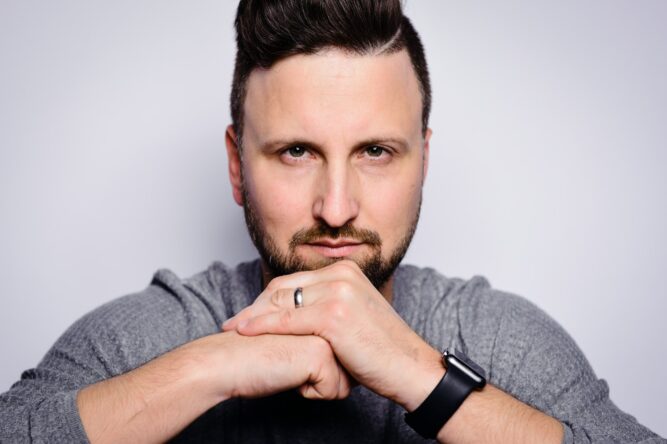Masking doesn’t always mean hiding who you are as a person in extreme ways.

Sometimes it’s subtle, automatic, and so deeply ingrained you don’t even realise you’re doing it. That’s especially true if you grew up trying to fit into spaces that didn’t feel made for you. If you’ve always felt a little out of sync but learned how to hide it, here are some signs you might be masking your neurodivergence, even if no one’s ever called it that (or knew it was a thing).
1. You rehearse conversations in your head before they happen.

Whether it’s small talk with a coworker or ordering at a café, you run the script in your mind beforehand. It’s not about being prepared—it’s about making sure you come off “normal” enough. It’s mental gymnastics that go unnoticed by everyone else.
That constant prepping is a form of social survival. You’re trying to reduce uncertainty and control how you’re perceived. Most people won’t notice it, but it takes up energy that other people don’t seem to burn.
2. You mirror the people around you without realising it.

You match someone’s tone, pace, body language, or interests—often without noticing until later. It’s automatic. You’re constantly adjusting to the room to blend in or avoid standing out too much. This isn’t being fake; it’s adaptation. Masking often looks like blending, and mirroring is one of the quickest ways to feel like you belong somewhere that doesn’t quite feel like home.
3. You overanalyse social situations long after they’re over.

You replay what you said, how it might’ve come across, and whether your expression matched the vibe. It’s exhausting, but you can’t turn it off. Even casual chats feel like a test you might’ve failed without realising it. That kind of mental spiral usually comes from masking. When you’ve trained yourself to monitor your social output constantly, you start double-checking everything, even when there’s no sign of an issue.
4. You laugh or smile when you’re confused or uncomfortable.

When things feel off, or you’re not sure what the right response is, you default to a smile or laugh. It’s not because you think it’s funny. It’s because you’ve learned that looking pleasant keeps people comfortable. It’s a coping mechanism, not a true reaction. As time goes on, it disconnects you from your real emotional cues. You’re not trying to lie—you’re trying to stay safe in situations that don’t make sense.
5. You avoid doing things you genuinely enjoy because they feel “too much.”

You might love certain topics, shows, routines, or sensory experiences—but you tone them down around other people. You’re afraid of coming off obsessive, intense, or weird, so you hide the stuff that you’re passionate about. Masking often means suppressing joy to stay palatable. It’s not just about hiding discomfort. It’s also about tucking away the parts of you that might not be understood. That kind of self-editing runs deep.
6. You’re constantly managing your facial expressions.

You’ve learned to smile when you don’t feel like it, raise your eyebrows at the right moment, or nod even when you’re not following. It’s all scripted—and it doesn’t come naturally. That level of performance doesn’t make you disingenuous—it’s helping you fit into social expectations that never felt intuitive. And it’s usually something you’ve been doing since childhood without even realising it had a name.
7. You often feel exhausted after socialising, even if it went well.

Even with people you like, you leave feeling drained. You were “on” the whole time—monitoring your tone, filtering your reactions, managing eye contact. It’s not that the interaction was bad; it’s that masking is tiring. That’s not introversion—it’s something deeper. When you’ve been socially compensating for years, your nervous system doesn’t fully relax, even in safe spaces. You’re always on alert, even when you look calm on the outside.
8. You don’t know what your authentic personality is anymore.

When you’ve spent so long adapting to other people’s expectations, it’s hard to tell where the mask ends and you begin. You might not even know what you genuinely like, how you actually talk, or what feels natural to you. The disconnect isn’t dramatic—it’s subtle and unsettling. You’ve been editing yourself for so long, the original version feels buried. That’s often the clearest sign that masking has taken root.
9. You hide your stimming or sensory behaviours.

You might chew gum, click a pen, adjust your sleeves, or bounce your leg, but only when no one’s watching. If you do it in public, it’s subtle, hidden, or masked as something “normal.” Stimming is natural for a lot of neurodivergent people; it’s regulation. However, masking teaches you to suppress even that, out of fear of standing out. So you tuck it away, even if it leaves you feeling edgy or overstimulated.
10. You worry about being “too much” or “too intense.”

You shrink your enthusiasm, soften your tone, or pull back when you get excited about something. You don’t want to come off as overbearing, even if you’re just being yourself. The constant scaling back is a key part of masking. You’re not trying to dominate—you’re trying not to be rejected for showing too much of what’s real. It’s not about ego. It’s about safety.
11. You mimic what seems “normal,” even if it doesn’t make sense to you.

Whether it’s social customs, humour, work dynamics, or dating etiquette—you copy what other people do because it seems to work. Even if it doesn’t feel natural, you try to get it “right.” Mimicry is one of the most common forms of masking. It’s not that you’re trying to fake who you are; you’re trying to survive in systems that weren’t built with your brain in mind.
12. You dread unstructured time with other people.

You love people, but the idea of “just hanging out” with no plan makes you tense. Without a clear structure or activity, you worry about how to act, what to say, or how long you’ll need to keep performing. The anxiety often comes from years of masking. Structured environments give you rules to follow. Unstructured ones feel like emotional improv, and that unpredictability can be genuinely overwhelming.
13. You’ve been called “high-functioning,” but still feel like you’re barely holding it together.

People might think you’re fine—successful, friendly, calm—but they don’t see how much effort it takes to keep that mask in place. Underneath, you’re often anxious, overstimulated, or just plain exhausted. The mismatch between how you’re perceived and how you feel is a classic sign of masking. People only see the version you’ve worked hard to create. They don’t see the cost behind it.
14. You script responses for expected questions.

Whether it’s “How was your weekend?” or “What do you do?”—you’ve got your answers locked and loaded. They’re safe, simple, and practiced. You’re not lying; you’re just managing risk. Scripting helps you avoid awkwardness or judgment. It keeps things smooth, but it also keeps you distanced from real connection. It’s another layer of masking you might not even realise you rely on.
15. You’re not sure how to unmask, even in safe spaces.

Even when people tell you to “just be yourself,” you freeze. Not because you don’t want to—but because you’re not sure what that even looks like anymore. You’ve been performing for so long, relaxing feels foreign. That’s one of the hardest parts of masking—learning to take it off. Especially when you’re not sure who you are without it. But recognising the mask is the start of building something that feels real, and that’s where the real freedom begins.




